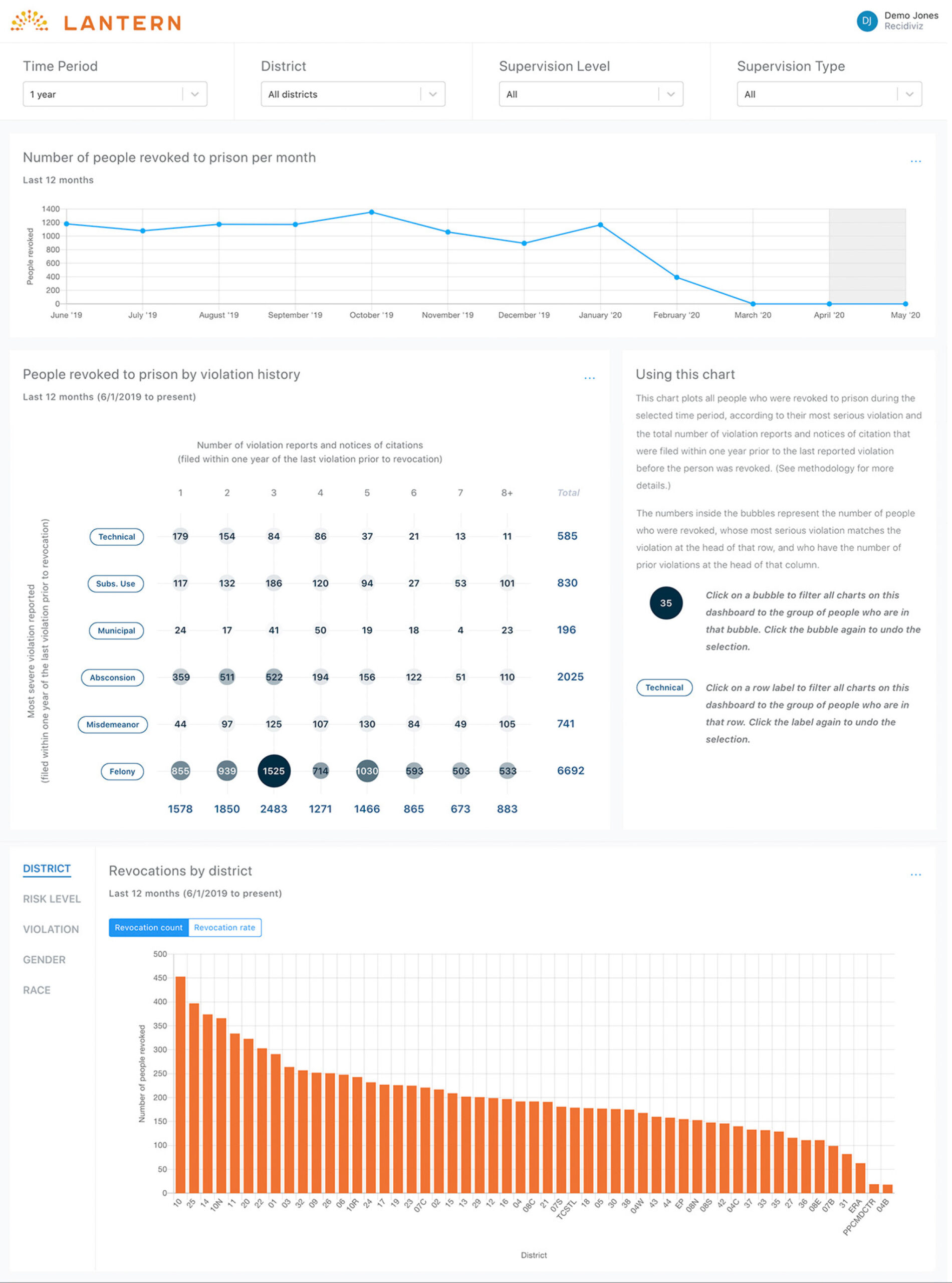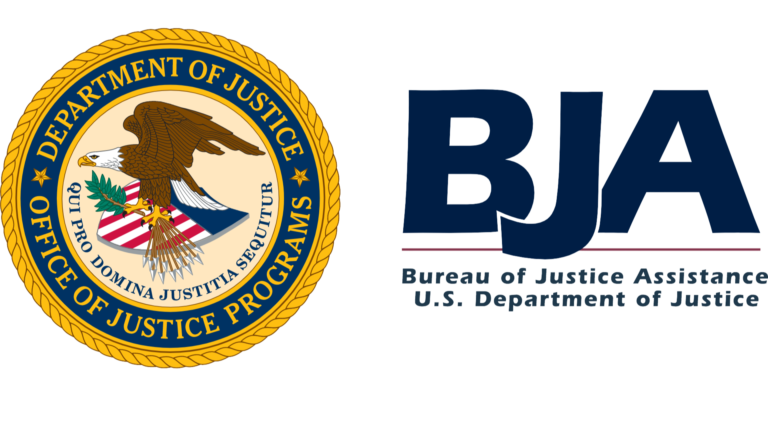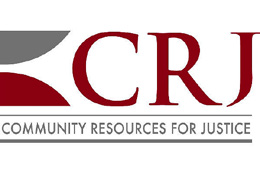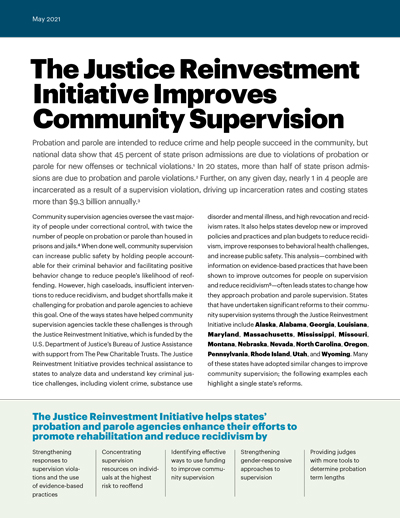The Justice Reinvestment Initiative Improves Community Supervision
Probation and parole are intended to reduce crime and help people succeed in the community, but national data show that 45 percent of state prison admissions are due to violations of probation or parole for new offenses or technical violations.1 In 20 states, more than half of state prison admissions are due to probation and parole violations.2 Further, on any given day, nearly 1 in 4 people are incarcerated as a result of a supervision violation, driving up incarceration rates and costing states more than $9.3 billion annually.3
Community supervision agencies oversee the vast majority of people under correctional control, with twice the number of people on probation or parole than housed in prisons and jails.4 When done well, community supervision can increase public safety by holding people accountable for their criminal behavior and facilitating positive behavior change to reduce people’s likelihood of reoffending. However, high caseloads, insufficient interventions to reduce recidivism, and budget shortfalls make it challenging for probation and parole agencies to achieve this goal. One of the ways states have helped community supervision agencies tackle these challenges is through the Justice Reinvestment Initiative, which is funded by the U.S. Department of Justice’s Bureau of Justice Assistance with support from The Pew Charitable Trusts. The Justice Reinvestment Initiative provides technical assistance to states to analyze data and understand key criminal justice challenges, including violent crime, substance use disorder and mental illness, and high revocation and recidivism rates. It also helps states develop new or improved policies and practices and plan budgets to reduce recidivism, improve responses to behavioral health challenges, and increase public safety. This analysis—combined with information on evidence-based practices that have been shown to improve outcomes for people on supervision and reduce recidivism5—often leads states to change how they approach probation and parole supervision. States that have undertaken significant reforms to their community supervision systems through the Justice Reinvestment Initiative include Alaska, Alabama, Georgia, Louisiana, Maryland, Massachusetts, Mississippi, Missouri, Montana, Nebraska, Nevada, North Carolina, Oregon, Pennsylvania, Rhode Island, Utah, and Wyoming. Many of these states have adopted similar changes to improve community supervision; the following examples each highlight a single state’s reforms.
The Justice Reinvestment Initiative helps states’ probation and parole agencies enhance their efforts to promote rehabilitation and reduce recidivism by
Strengthening responses to supervision violations and the use of evidence-based practices
Concentrating supervision resources on individuals at the highest risk to reoffend
Identifying effective ways to use funding to improve community supervision
Strengthening gender-responsive approaches to supervision
Providing judges with more tools to determine probation term lengths
Strengthening Responses to Supervision Violations and Requiring the Use of Evidence-Based Practices
In 2014, Mississippi passed comprehensive Justice Reinvestment legislation that improved key aspects of community supervision by requiring the use of a risk and needs assessment to identify and focus resources on people at the highest risk to reoffend; the development of a system of swift, certain, and proportionate sanctions for technical violations of probation and parole to change behavior and reduce revocations; and establishment of earned discharge credits to reduce caseloads and incentivize compliance with conditions of supervision.
The legislation made a number of changes to the ways in which field officers, as well as courts and the parole board, can respond to technical supervision violations by people on probation, parole, or post-release supervision. For example, officers responding to technical violations now have the authority to impose graduated sanctions prior to initiating a formal revocation. Additionally, the legislation established earned time credits that could shorten an individual’s supervision period, offering an additional incentive for complying with supervision conditions.
Mississippi has worked to institute a robust case planning approach and has enhanced training for parole board members and community supervision officers on evidence-based practices. In the four years following the enactment of Justice Reinvestment legislation, the number of people on probation who discharged successfully increased 10 percent, and fewer people on supervision were charged with new crimes.
Concentrating Supervision Resources on Individuals at the Highest Risk to Reoffend
In 2017, Louisiana passed the most comprehensive criminal justice reform package in state history through the Justice Reinvestment Initiative. The legislation was designed, in part, to strengthen community supervision by reducing probation and parole officers’ caseloads and adopting evidence-based practices to address violations swiftly and proportionately.
The legislation reduced the maximum probation term for most people convicted of nonviolent offenses from five years to three years and established an earned compliance credit system to incentivize compliance with supervision conditions. In addition, the Louisiana legislature extended the use of alternatives to incarceration by expanding probation eligibility to include certain individuals convicted of third-time nonviolent offenses and first-time lower-level violent offenses. Taken together, these changes prioritize prison space for people convicted of more serious offenses and allow community supervision officers to focus time and resources on people at the highest risk to recidivate.
Through these changes and others, Louisiana saved $12.2 million in the first year after implementing Justice Reinvestment legislation—double the original projected savings. The state has continued to see significant savings in subsequent years. Seventy percent of savings from reduced corrections costs each year go toward initiatives that reduce recidivism and support victims of crime.
Identifying Effective Ways to Use Funding to Improve Community Supervision
In 2015, Nebraska enacted Justice Reinvestment legislation that required the use of probation rather than incarceration for most people convicted of nonviolent, lower-level offenses; ensured post-release supervision for most people upon release from prison; and strengthened parole supervision to reduce recidivism. The state also ensured the use of swift, certain, and proportionate responses to violations of parole supervision and improved data collection and reporting across state agencies.
To support implementation and improve community supervision, Nebraska reinvested $15.3 million in savings the state generated from the legislation in 2016 and 2017 in targeted improvements to parole supervision, additional probation officers, community-based programs and treatment, and quality assurance measures. Nebraska developed a graduated incentives and sanctions response matrix and made other improvements to streamline supervision, including purchasing electronic tablets and software to allow parole officers to access real-time information to better guide their responses in the field.
As a result of the state’s Justice Reinvestment legislation, more people received support and monitoring upon their transition from prison to the community, which is the most critical period for preventing recidivism. In 2018, the number of people released to parole or post-release supervision grew to 74 percent of all releases, an increase of 39 percent compared to 2015.
Strengthening Gender-Responsive Approaches to Supervision
Missouri enacted Justice Reinvestment legislation in 2018 to increase the effectiveness of its corrections system and make better use of resources. Through the Justice Reinvestment Initiative, the Department of Corrections committed to advancing a host of evidence-based practices to improve community supervision outcomes and reduce prison admissions due to revocations. The department implemented a validated risk and needs assessment tool and a standardized matrix of sanctions and incentives to facilitate behavior change.
The Department of Corrections’ leadership and probation and parole administrators improved their capacity to address underlying risk and needs that contribute to crime by transitioning six existing Community Supervision Centers (CSCs) into state-of-the-art facilities that serve people on probation and parole at high risk for revocation and being returned to prison. The CSCs use intensive programming, community supervision goal setting, and community reentry support to foster positive behavior change.
In February 2019, Missouri opened the repurposed Fulton CSC as its first-ever female-only, trauma-informed facility with gender-responsive approaches to supervision, case management, and programming. Missouri is implementing cognitive behavioral intervention programs at the CSCs, including Moving On, a gender-specific program for women that promotes healthy relationships and life skills. Since opening, the Fulton CSC has served over 200 women at high risk for revocation to prison. In the first year of operation, only one Fulton CSC client was returned to prison for a violation of the conditions of supervision.
Missouri also participates in Lantern, a collaborative project between The Council of State Governments (CSG) Justice Center and Recidiviz that helps states safely reduce revocation admissions to prison and turns data streams into actionable information corrections agencies can use to inform decisions about policy and practice. The Lantern tools Missouri utilizes are designed to pull together previously disconnected data points into a clear narrative that helps the state more effectively track and analyze changes in violating behavior, revocations, and overall supervised populations in powerful ways. (See Figure 1.)
Figure 1: Lantern Data Dashboard with Sample Data

Providing Judges with More Tools to Determine Probation Term Lengths
In 2019, Wyoming enacted a package of Justice Reinvestment legislation that aims to reduce recidivism 25 percent by 2024 and avert up to $18.1 million in costs that can be reinvested in increasing the availability and effectiveness of community-based behavioral health treatment for people on probation and parole. The legislation will enable consistency in judicial decision-making, promote the use of early discharge from probation, seek to reduce the number of people who are revoked from supervision while still holding people accountable and promoting positive behavior change, and ensure that probation resources are focused where and when they provide the most public safety benefit. To help meet these goals, the state adopted a rewards and sanctions matrix to promote behavior change and trained probation and parole officers on core correctional practices, a set of evidence-based practices that encourage prosocial change among those on supervision.
Judges will have additional tools to help determine probation term lengths. Courts will be able to sentence people to unsupervised probation and impose fines related to the offense, reduce terms of probation, and consider eight standardized criteria when determining the period of probation or modification of a term. These criteria include risk of reoffending, nature and seriousness of the underlying crime, and progress in addressing substance use disorders, among other things.
Expanding Access to Community-Based Behavioral Health Treatment
In 2018, Massachusetts enacted two major pieces of legislation informed by the Justice Reinvestment process that represented the most significant changes to the state’s criminal justice system in decades. This legislation took concrete steps to incentivize good behavior in prison, divert people to treatment and programming as an alternative to incarceration, and strengthen community supervision. Through Justice Reinvestment, the Massachusetts Probation Service developed a new curriculum and training plan for officers. The new curriculum and training aligns the state’s community supervision efforts with best practices on recidivism-reduction strategies and modified caseload allocations so that higher-risk clients receive a greater proportion of supervision services.
The state also dedicated funding to expand a behavioral health pilot program that provides individualized supports and services for people who are in the criminal justice system, have serious mental illnesses and/or substance use disorders, and are at a high risk of reoffending. The expansion will allow Massachusetts to double the number of people the pilot program serves and reserve half of the available slots for people on community supervision, enhancing their connection to community-based supports, which can help improve mental health outcomes and reduce recidivism.
Endnotes
- The Council of State Governments, Confined and Costly: How Supervision Violations are Filling Prisons and Burdening Budgets (New York: The Council of State Governments Justice Center, 2019).
- Ibid.
- Ibid.
- Laura M. Marushak and Todd D. Minton, Correctional Populations in the United States, 2017-2018 (Washington, DC: Office of Justice Programs, Bureau of Justice Statistics, 2020).
- The Pew Charitable Trusts, Policy Reforms Can Strengthen Community Supervision: A Framework to Improve Probation and Parole (Washington, DC: The Pew Charitable Trusts, 2020).

This project was supported by Grant No. 2015-ZB-BXK001 awarded by the Bureau of Justice Assistance. The Bureau of Justice Assistance is a component of the Office of Justice Programs, which also includes the Bureau of Justice Statistics, the National Institute of Justice, the Office of Juvenile Justice and Delinquency Prevention, the Office for Victims of Crime, and the SMART Office. Points of view or opinions in this document are those of the author and do not necessarily represent the official position or policies of the U.S. Department of Justice.

The Council of State Governments (CSG) Justice Center is a national nonprofit, nonpartisan organization that combines the power of a membership association, representing state officials in all three branches of government, with policy and research expertise to develop strategies that increase public safety and strengthen communities. For more information about the CSG Justice Center, visit www.csgjusticecenter.org.

The Crime and Justice Institute bridges the gap between research and practice with data-driven solutions that drive bold, transformative improvements. With a reputation built over many decades for innovative thinking, a client-centered approach, and impartial analysis, CJI assists in developing effective policies, creates and supports implementation strategies, and drives positive change across the spectrum of the adult and juvenile justice systems. For more information, visit www.crj.org/cji.

